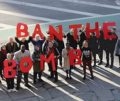
The UN General Assembly adopted a resolution in December 2016 that agreed to “negotiate a legally binding instrument to prohibit nuclear weapons, leading towards their total elimination” and encouraged all member states to participate. The vote was 113 in favour, 35 against including Australia, with 13 abstentions.
If successful, this new international agreement will place nuclear weapons on the same legal footing as other weapons of mass destruction, which have long been outlawed.
First session – 27 to 31 March
The initial negotiations told place at UN headquarters in New York from 27 to 31 March and will continue from 15 June to 7 July 2017 with the participation of governments, international organisations and civil society.
Australia’s opposition
Not only did the Australian government oppose the General Assembly’s resolution in December 2016 but it has boycotted the initial negotiations held recently in March.
That decision to boycott the disarmament talks, made public in mid-February, is based upon the long held view in government and defence circles that Australia’s security is dependent on the “extended deterrence” provided by America’s nuclear arsenal. As such, Australia supports the use of these weapons of mass destruction by the US on our behalf. Neither the circumstances in which these weapons would be employed, nor the identity of the populations to be targeted in a nuclear strike in order to “protect” us, have ever been explained.
The decision also calls into question Australia’s commitment to the 1968 Treaty on Non-Proliferation of Nuclear Weapons (NPT) which obliges all member states, not just nuclear armed nations, to “pursue negotiations in good faith on effective measures relating to … a treaty on general and complete disarmament under strict and effective international control.”
It is also evident that the Turnbull government’s boycott will undermine its frequent advocacy for a “rules-based international system” if it persists in actively opposing the UN’s historic goal of strengthening international law in conformity with the non-proliferation treaty’s commitment to complete disarmament.
Despite Australia’s reprehensible stance, the first session of the March negotiations, involving 132 nations, was a success.
Second session – 15 June to 7 July
A draft treaty text will be released by the UN in the coming month and negotiations will resume in New York on 15 June. It may well be the case that by 7 July this year a treaty prohibiting nuclear weapons will be adopted.
More information
A report by the International Campaign to Abolish Nuclear Weapons (ICAN) on the initial March discussions can be read here.
Also refer to the full text of the Non-Proliferation Treaty here. Article VI states: “Each of the Parties to the Treaty undertakes to pursue negotiations in good faith on effective measures relating to cessation of the nuclear arms race at an early date and to nuclear disarmament, and on a treaty on general and complete disarmament under strict and effective international control.”
* Ban the Bomb photo by ICAN